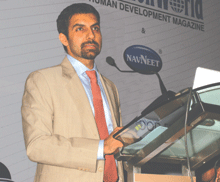 Within the past two decades, new age information communication technologies (ICT) have dramatically improved learning outcomes in education by enabling students to access the latest learning and best teachers of the world; to learn through underst-anding rather than memorisation, and learn at their own pace.
Within the past two decades, new age information communication technologies (ICT) have dramatically improved learning outcomes in education by enabling students to access the latest learning and best teachers of the world; to learn through underst-anding rather than memorisation, and learn at their own pace.
Given India’s large population, huge distances, uneven geographical development, mass illiteracy and poor learning outcomes in schools and colleges, there’s no doubt in my mind that new age ICT offers the only hope of attaining the Millenium Development Goal of primary education for all by 2015, and the national aspiration of universalisation of secondary education. Therefore it’s of utmost importance to introduce children to the idea of learning through ICT as early as possible.
In pursuance of this objective, the Universal Education Group introduced iPod Touch as a learning tool for nursery children in our schools in 2009. Over 4,000 young learners in eight schools are currently using the iPod Touch — a portable pocket computer produced by Apple Inc with a multi-touch screen, a video player and an internet browser.
Under this programme, every pre-kindergarten child is given an individual iPod for a specified time period (approx 30 minutes, four times per week) as per a curriculum programme drawn up for each age group. Children are split into small groups and engage in iPod-centric activities directed by the class teacher.
All iPods have two key features — apps (applications) and content. Apps are interactive programs that can be downloaded from Apple’s App Store. These programs help children learn a range of skills in an enjoyable and interactive way — alphabets, numbers, drawing, colouring, cursive writing, maths, flash cards and memory games. Content in the iPod includes multimedia stories, audio books, e-books, nursery rhymes and videos. All apps and content are pre-loaded, age-appropriate and well-organised.
Our studies indicate that children in our pre-schools have derived four key ‘I’ benefits from this initiative.
Interest. Learning outcomes are best achieved when learning is experiential and enjoyable. Varied content ensures children grasp concepts better.
Intuition. Since there are no barriers to usage, after a while, the iPod stops becoming a ‘thing’. Soon children begin to instinctively use technology to colour an outline or to get the spellings or maths right.
Interaction. Learners get instant feedback on any task with a “uh oh”, “yippee”, or error message. This stimulates self-learning. Some apps are modeled around games with levels, bonus points, rewards, and setbacks.
Individualism. Each child has her own iPod for which she develops as much love as for a soft toy or pet. Children can choose apps that suit their learning styles and can learn anywhere — the classroom, play area and even at home.
Our experience over the past year since we introduced this revolutionary technology in our pre-school sections is that children absolutely love the iPod. More pertinently, our research indicates a phenomenal jump in learning outcomes.
The game-changing benefit of this initiative has been in cognitive skills development. We now know that skills of reading, writing, rhymes, stories, numbers, shapes, colours, etc are better grasped and learnt through ICT usage. We have also witnessed improvement in communication skills, levels of concentration and fine motor skills development.
Admittedly, ipods are not particularly helpful in developing a child’s social skills. They also have no role to play in physical development, art and craft work, field trips, picnics, etc. But they can be effectively used to playback recorded videos of these events. This allows the child to revisit an event and experience.
The biggest challenges in implementing this technology innovation were in teacher training and educating parents on the efficacy of using ICT for pre-schoolers. Other challenges included impact protection, using safe materials, content filtering, and ease of carriage/handling. Since most of the pre-loaded educational content in the iPods was designed for American children, curriculum experts had to be roped in to customise content to suit local needs.
Apart from making learning a joyful and enjoyable experience for children, another positive outcome of this innovation is that technology becomes a part of every child’s DNA. Catching them young prepares them to embrace all things digital. As they grow, their comfort with technology will hold them in good stead to find their way around the increasingly digital world.
(Jesus S. M. Lall is chairman and CEO of the Mumbai-based Universal Education Group which currently boasts 18 schools and colleges across western India with an enrolment of over 25,000 students)